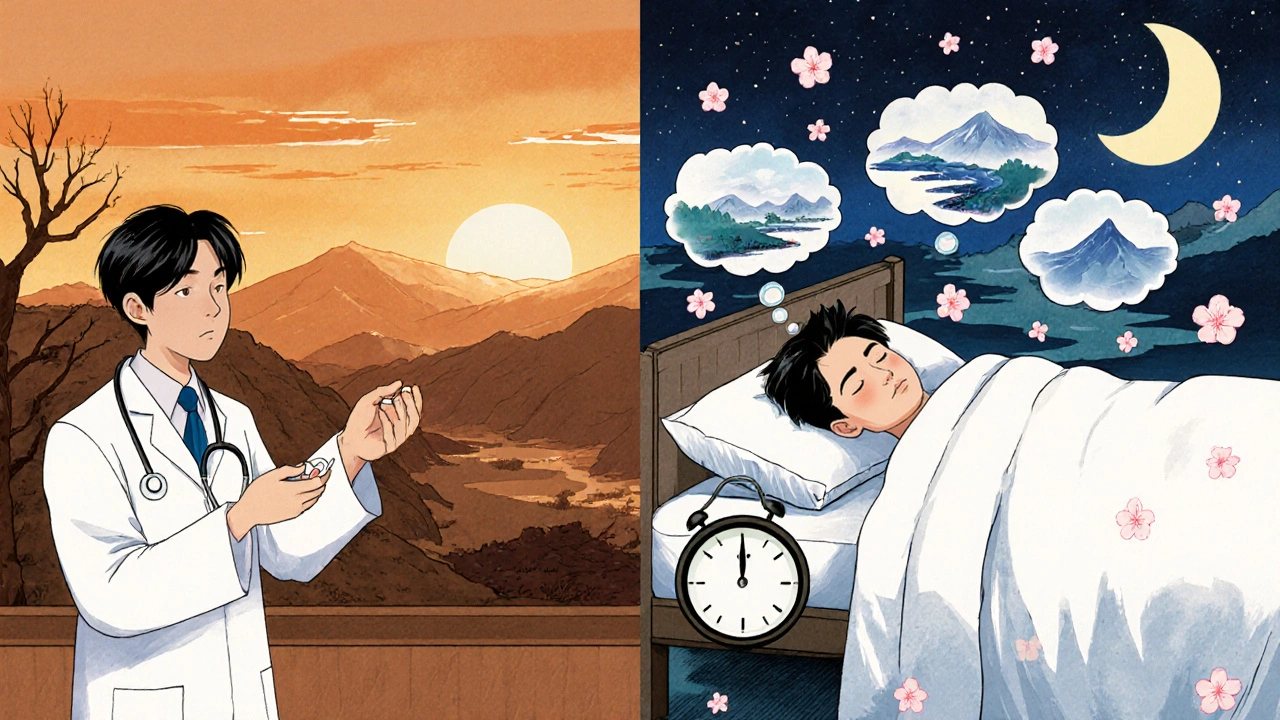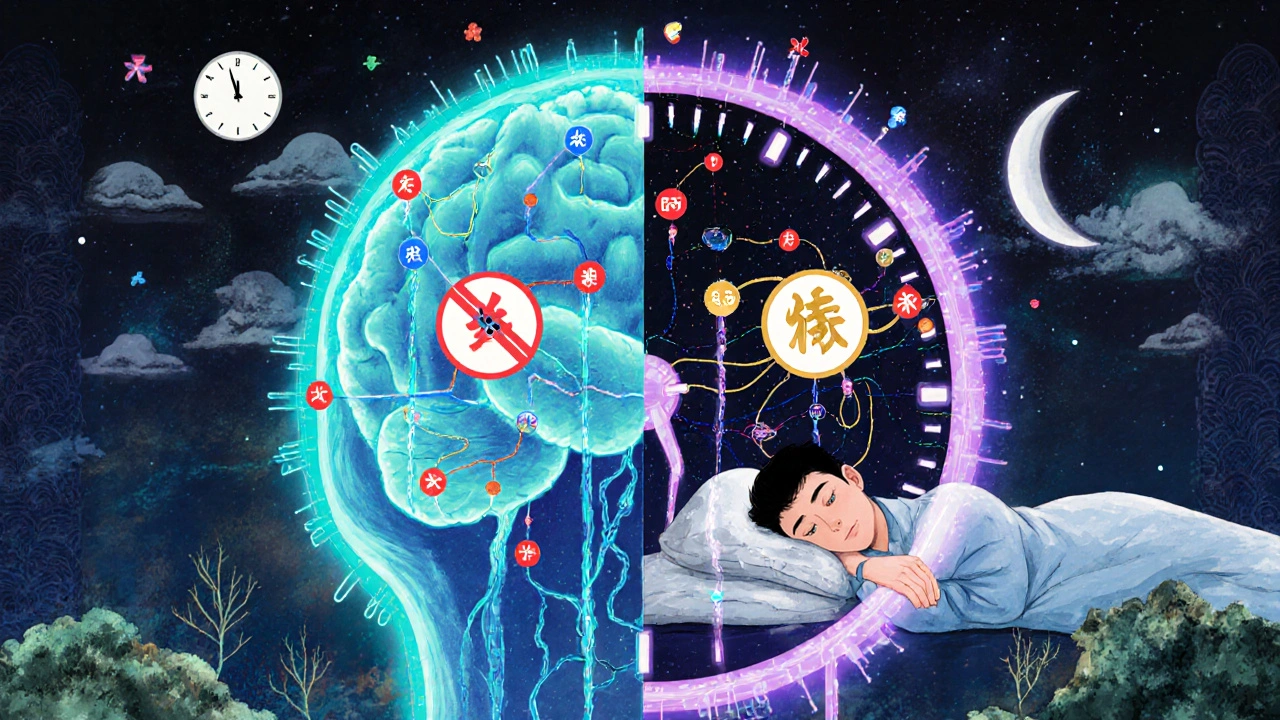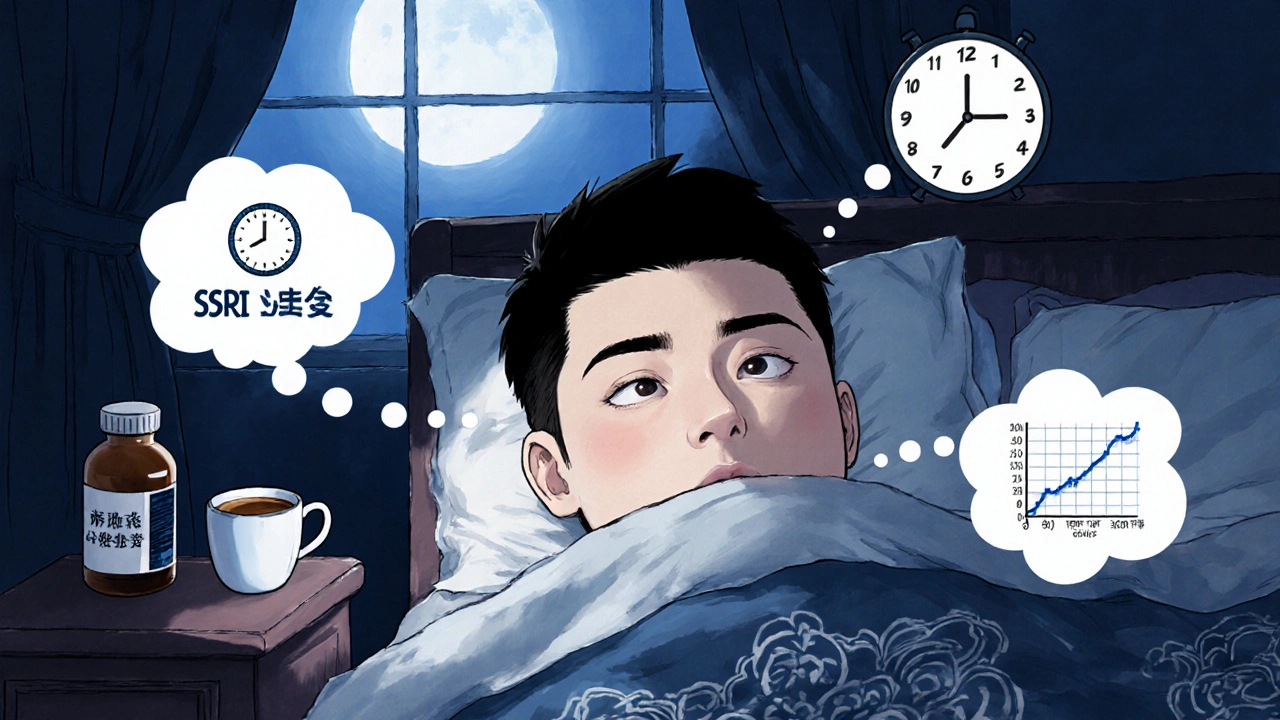Antidepressant Sleep Profile Selector
How your sleep profile affects antidepressant choice
This tool helps you match antidepressants to your sleep issues. The right choice can make the difference between recovery and relapse.
When you start an antidepressant, you expect your mood to improve. But for many, the first thing that changes is sleep-and not always for the better. Insomnia, vivid dreams, waking up in the middle of the night, or feeling groggy all day aren’t just side effects. They’re direct results of how these medications interact with your brain’s sleep-wake system. And if you’re already struggling with sleep because of depression, this can make things feel worse before they get better.
Why Antidepressants Mess With Your Sleep
It’s not random. Every major class of antidepressants-SSRIs, SNRIs, TCAs, and others-changes the levels of serotonin, norepinephrine, and dopamine in your brain. These aren’t just "mood chemicals." They’re also key players in regulating when you fall asleep, how deep your sleep is, and how much time you spend in REM sleep-the stage linked to dreaming and emotional processing. For example, SSRIs like fluoxetine and sertraline suppress REM sleep by 18-29% in the first week. That might sound harmless, but REM suppression is tied to how quickly antidepressants start working. The problem? Many people feel more awake at night because of this. Studies show 65-78% of people on SSRIs report trouble falling or staying asleep during the first two weeks. Fluoxetine hits hardest-78% of users say their sleep gets worse at first. On the flip side, some antidepressants like mirtazapine and trazodone do the opposite. They increase total sleep time and reduce how long it takes to fall asleep. Mirtazapine adds nearly an hour of sleep on average. Trazodone cuts nighttime wakefulness by 37%. But they come with trade-offs: daytime drowsiness, dry mouth, or even restless legs.Which Antidepressants Are Worst for Insomnia?
Not all antidepressants affect sleep the same way. Here’s what the data shows:- SSRIs (fluoxetine, sertraline, paroxetine): Highest risk of insomnia. Fluoxetine causes sleep problems in nearly 8 out of 10 people early on.
- SNRIs (venlafaxine, duloxetine): Mixed effects. Venlafaxine can cause insomnia at lower doses (75-150 mg), but the risk drops at higher doses (225 mg).
- Bupropion: A stimulant-like antidepressant. It’s linked to 2.4 times higher risk of insomnia when combined with SSRIs.
- TCAs (amitriptyline): Sedating at low doses, but can cause next-day grogginess and dry mouth.
Which Antidepressants Help With Sleep?
Some antidepressants are actually prescribed for their sleep benefits. These aren’t just "sleep meds"-they’re antidepressants that happen to calm the nervous system.- Mirtazapine (7.5-15 mg): The top choice for depression with insomnia. It increases total sleep time by 47 minutes and improves sleep efficiency by 32%. But doses above 30 mg often cause too much daytime sleepiness.
- Trazodone (25-50 mg at bedtime): Used off-label for sleep. 81% of users say it helps them fall asleep. But 2.3 out of 5 patients report a "hangover" effect the next day.
- Agomelatine: Works by resetting your body clock. It reduces REM suppression to just 8% (compared to 22% for SSRIs). A 2024 study showed it improved both mood and sleep continuity better than escitalopram.

Timing Matters More Than You Think
Taking your medication at the wrong time can turn a good drug into a sleep killer-or a sleep savior.- SSRIs and SNRIs: Take them in the morning, before 9 a.m. A 2020 study found this reduces insomnia risk by 41%. Taking them after noon increases the chance of nighttime wakefulness.
- Mirtazapine and trazodone: Take them 2-3 hours before bed. This lets the sedative effect peak when you’re trying to sleep, not the next morning.
- Bupropion: Never take it after noon. Its stimulating effects last 10-12 hours.
What to Do If Sleep Gets Worse at First
It’s common for sleep to get worse before it gets better-especially with SSRIs. The worst insomnia usually hits days 3-7 and fades by week 3-4. That’s because your brain slowly adapts to the new chemical balance. Here’s what works:- Keep a sleep diary for two weeks. Write down when you go to bed, wake up, how long it took to fall asleep, and how many times you woke up. This helps your doctor spot patterns.
- Don’t double your dose if you’re not sleeping. More isn’t better-it often makes things worse.
- If you’re on an SSRI and can’t sleep after 3 weeks, talk to your doctor about switching to mirtazapine or adding a low-dose sedating agent.
- Avoid caffeine after 2 p.m. and alcohol at night. Both interfere with sleep architecture and make antidepressant side effects worse.

New Options on the Horizon
The field is changing fast. In July 2023, the FDA approved zuranolone (Zurzuvae), the first antidepressant specifically designed to improve sleep within two weeks. In clinical trials, it cut insomnia symptoms by 54%. Genetic testing is also entering the picture. In 2025, Genomind launched a $349 test that analyzes 17 genes to predict how you’ll respond to 24 antidepressants in terms of sleep. It’s not perfect yet, but it’s a step toward personalizing treatment instead of guessing. The National Institute of Mental Health is now funding research to match antidepressants to your body clock. If you’re a night owl versus a morning person, your best drug might be different.Bottom Line: Match the Drug to Your Sleep Profile
There’s no one-size-fits-all antidepressant. The key is matching the drug to your sleep pattern:- If you have trouble falling asleep and wake up too early? Start with mirtazapine 7.5-15 mg at bedtime.
- If you sleep too much during the day and feel sluggish? Avoid sedating drugs. Try a morning SSRI like sertraline.
- If you’re already on an SSRI and can’t sleep? Move your dose earlier. Give it 3 weeks. If it doesn’t improve, talk about switching.
- If you’re on multiple meds? Watch for combinations like bupropion + SSRI-they’re a known trigger for severe insomnia.
Do all antidepressants cause insomnia?
No. While SSRIs and SNRIs like fluoxetine and venlafaxine commonly cause insomnia-especially at the start-other antidepressants like mirtazapine, trazodone, and agomelatine are actually used to improve sleep. The effect depends on the drug, the dose, and your individual brain chemistry.
How long does insomnia last when starting an SSRI?
For most people, insomnia peaks between days 3 and 7 after starting an SSRI. It usually improves on its own within 21 to 28 days as the brain adjusts. If sleep hasn’t improved by week 4, it’s unlikely to get better without a change in medication or timing.
Can I take a sleep aid with my antidepressant?
Sometimes, yes-but only under medical supervision. Low-dose trazodone (25-50 mg) is often used alongside SSRIs for sleep. Melatonin or magnesium glycinate may help too. But avoid over-the-counter sleep pills with diphenhydramine-they can worsen depression symptoms long-term and interact dangerously with some antidepressants.
Is it safe to switch antidepressants because of sleep problems?
Yes, and it’s often the best move. Many people stay on an SSRI too long because they think sleep issues will go away-but if they don’t improve after 4 weeks, the drug may not be the right fit. Switching to mirtazapine or agomelatine can dramatically improve both mood and sleep. Always taper off slowly under a doctor’s guidance.
Why does my doctor care about my REM sleep?
REM sleep suppression is linked to how well antidepressants work. Studies show people with greater REM reduction in the first two weeks are more likely to respond to treatment. But too much suppression can also trigger nightmares or REM behavior disorder. It’s a balance-your doctor monitors it to make sure the drug is working without causing new problems.
Should I get a sleep study if I’m on antidepressants?
Not routinely-but if you’re having violent dreams, acting out dreams, kicking your legs, or feeling extremely restless at night, yes. Polysomnography can detect REM sleep behavior disorder or restless legs syndrome, both of which are worsened by SSRIs in up to 65% of users. Early detection can prevent injury and help adjust your treatment.

Victoria Short
November 17, 2025 AT 07:27This is way too much info for someone just trying to sleep.
Jessica M
November 19, 2025 AT 01:12The clinical data presented here is both comprehensive and clinically relevant. It is imperative that patients and clinicians alike recognize that sleep architecture is not a peripheral concern in antidepressant therapy, but rather a core neurobiological endpoint. The suppression of REM sleep by SSRIs is not merely an adverse effect-it is a biomarker of pharmacodynamic activity, and its modulation correlates with therapeutic latency. Timing of administration, particularly for serotonergic agents, remains one of the most underutilized clinical levers in psychiatric practice.
Furthermore, the distinction between sedating antidepressants and those that induce insomnia is not arbitrary; it reflects differential receptor affinities at histaminergic, adrenergic, and serotonergic pathways. Mirtazapine’s antagonism of H1 and 5-HT2C receptors, for instance, explains its robust sleep-promoting profile, whereas bupropion’s noradrenergic-dopaminergic action predisposes to arousal. These are not side effects-they are pharmacological signatures.
Patients who discontinue SSRIs due to initial insomnia often miss the window of neuroadaptive change. The brain requires approximately 21 days to recalibrate 5-HT receptor sensitivity, and sleep normalization typically follows. Sleep diaries are not optional-they are diagnostic tools. And while adjunctive melatonin may offer modest benefit, it does not substitute for appropriate medication selection or timing.
Lastly, the emergence of zuranolone represents a paradigm shift: an antidepressant whose primary mechanism includes GABA-A modulation, thereby directly targeting sleep-wake dysregulation. This is the future-not a supplement, but a pharmacologically integrated solution.
Koltin Hammer
November 20, 2025 AT 10:53Man, I remember when I started sertraline. First three nights I was wide awake, staring at the ceiling like it owed me money. Thought I was losing my mind. Then one day I just moved my pill to 7 a.m. instead of 8 p.m. and boom-slept like a rock. No magic, just dumb timing. Why do doctors never tell you this stuff upfront? Like, it’s not even a secret. The whole internet’s full of people saying the same thing. Maybe if we stopped treating mental health like it’s rocket science and started treating it like… common sense, we’d all be better off.
Also, trazodone isn’t a sleep aid. It’s just a depressed person’s benadryl. You wake up feeling like you got hit by a bus, but at least you slept. I’d rather take a nap in a laundry basket than deal with that hangover again.
Eric Gregorich
November 22, 2025 AT 08:09Let me ask you something real-why do we keep pretending that antidepressants are just ‘chemical balancers’? That’s a fairy tale for people who don’t want to face the truth: these drugs are neurological wrecking balls. They don’t fix your brain-they hijack it. And then we act surprised when you can’t sleep, can’t feel anything, or start dreaming about your dead grandmother screaming in Latin? Wake up. We’re not treating depression. We’re chemically reprogramming human consciousness and calling it medicine. The fact that we’re now testing genetic tests to predict which version of this chaos will ‘work’ for you? That’s not science. That’s gambling with your sanity. And don’t even get me started on zuranolone. Another ‘breakthrough’ that’s just a fancy sedative with a patent. We’re not healing. We’re managing symptoms with increasingly complex cocktails while ignoring trauma, poverty, loneliness, and the fact that our entire society is a sleep-deprived nightmare. You want better sleep? Stop taking the pill. Stop living in a 24/7 capitalist hellscape. But no-better to tweak the dose than fix the world, right?
Phil Best
November 22, 2025 AT 23:05Oh, so now we’re giving out medals to mirtazapine like it’s the superhero of sleep? Meanwhile, I’m over here with restless legs so bad I kicked my dog last week. He’s not talking to me. And trazodone? That’s not a sleep aid-it’s a 3 a.m. zombie pill. You fall asleep, sure. Then you wake up at 5 a.m. feeling like your brain got dipped in glue. And don’t even mention splitting doses. I tried that. Now I’m awake at 2 p.m. wondering why I’m holding a spoon like it’s a weapon. This whole system is a circus. Someone’s making money off our insomnia, and it ain’t us.
Connor Moizer
November 24, 2025 AT 19:15Look, if you’re on an SSRI and you’re still awake at 2 a.m., don’t just sit there hoping it ‘gets better.’ You’re not being patient-you’re being stupid. Move the damn pill to morning. That’s step one. If it doesn’t help in 10 days, switch. Don’t wait four weeks like some martyr. Your sleep is not a trophy. It’s your foundation. No sleep = no recovery. Period. And if your doctor doesn’t get that, find a new one. You’re not being difficult-you’re being smart. This isn’t rocket science. It’s medicine. Do the basics.
Parv Trivedi
November 26, 2025 AT 07:10This is a very thoughtful and well-researched article. As someone from India where mental health stigma is still strong, I appreciate how clearly the science is explained. Many people here think insomnia is just ‘stress’ and avoid medication altogether. But this shows it’s biological, not weakness. I’ve seen friends struggle with fluoxetine and then switch to mirtazapine-sleep improved dramatically. I wish more doctors here knew about timing. Taking SSRIs at night is so common, even though it’s the worst thing you can do. Thank you for sharing this. It helps people like me talk to our families with confidence.
Willie Randle
November 26, 2025 AT 20:36I’ve been a psychiatric nurse for 18 years. I’ve seen this pattern over and over. Patients start an SSRI, panic because they can’t sleep, assume it’s ‘not working,’ and quit. Then they spiral. What they don’t realize is that the brain is rewiring. The insomnia peaks around day 5. It’s not a sign of failure-it’s a sign the drug is doing its job. I always tell patients: ‘If you’re still awake at 3 a.m., write down three things you’re grateful for. Then go back to sleep. Don’t check your phone. Don’t think about tomorrow.’ Simple, but it works. And yes-timing matters. Morning doses. No caffeine after 2. No alcohol. These aren’t suggestions. They’re non-negotiables. If you’re serious about healing, treat sleep like your job.
kanishetti anusha
November 27, 2025 AT 19:37I started on sertraline last month. First week was hell. Couldn’t sleep. Felt like my thoughts were running on a treadmill. But I kept a sleep diary like the article said. Day 4: 3 a.m. wake-up. Day 7: 2 a.m. Day 14: 1 a.m. Day 21: 11:30 p.m. I didn’t change anything except timing-switched from night to morning. And now? I sleep. Not perfectly. But better. I almost quit. I’m so glad I didn’t. This article saved me. Thank you.
Rebekah Kryger
November 29, 2025 AT 16:08Okay, but let’s be real-this whole ‘REM suppression = therapeutic effect’ thing is just a corporate narrative. Who even measures REM sleep in a primary care office? No one. The real reason SSRIs cause insomnia is because they’re stimulants disguised as antidepressants. And don’t get me started on ‘agomelatine’-sounds like a new energy drink. Meanwhile, my cousin took trazodone and now he’s sleepwalking and yelling at his toaster. So yeah, ‘improved sleep profile’ my ass. This whole industry is built on half-truths and patent extensions. Wake up, people. You’re being sold a dream.
Erika Lukacs
November 29, 2025 AT 23:53There is a certain irony in the fact that we seek to chemically restore the natural rhythm of sleep, yet we do so through the very substances that disrupt it. Is this not a metaphysical paradox? We have outsourced our inner equilibrium to molecular intervention, and now we measure our recovery not by peace of mind, but by the duration of uninterrupted REM cycles. The body, once a temple, has become a laboratory. And we, its unwilling subjects, are expected to applaud the precision of the experiment, even as it steals our nights. Perhaps the real treatment is not in the pill-but in the quiet, the stillness, the unmedicated darkness we have forgotten how to inhabit.
roy bradfield
November 30, 2025 AT 17:39They don’t want you to know this, but all antidepressants are part of a secret government program to keep the population docile and sleep-deprived. The FDA approved zuranolone because it makes people too tired to protest. The genetic tests? They’re tracking your brainwaves. Mirtazapine is designed to make you compliant. Trazodone? It’s laced with microchips. They don’t care if you sleep-they care if you stay quiet. Look at the dates: 2023, 2025… they’re accelerating. Why? Because they’re running out of time. The sleep industry is a front. The real goal is population control. You think your insomnia is bad? Wait until they start syncing your dreams to satellite signals. I’ve already seen the signs. Don’t take the pill. Don’t trust the diary. Burn the article. Sleep with one eye open.